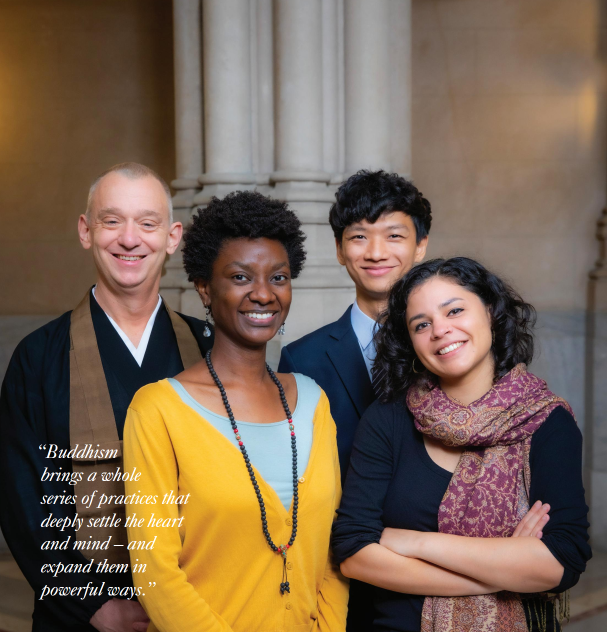 Thanks to years of careful cultivation and intentional investment, Union Theological Seminary is home to a vibrant, one-of-a-kind Buddhism program. The Thich Nhat Hanh Program for Engaged Buddhism (BIE) teaches students how to understand social justice through Buddhism, engage each other in faith without causing harm, and use Buddhist principles to address the world’s most pressing issues.
Thanks to years of careful cultivation and intentional investment, Union Theological Seminary is home to a vibrant, one-of-a-kind Buddhism program. The Thich Nhat Hanh Program for Engaged Buddhism (BIE) teaches students how to understand social justice through Buddhism, engage each other in faith without causing harm, and use Buddhist principles to address the world’s most pressing issues.
It all started years ago with the leadership of Rev. Kosen Greg Snyder, Osho. By happenstance, Rev. Snyder and UTS President Rev. Dr. Serene Jones were both selected to embark on a trip with fellow U.S. religious leaders to meet with theologians in Iran. On that excursion, they explored the possibility of developing a rigorous Buddhism program in New York City.
After much discussion, they decided to move forward – and Rev. Snyder got to work. He had a unique vision: He aspired to start a program in which anybody could take part – from very serious lay practitioners to ordained Buddhists. He also aimed to put social justice at the center of every single lesson.
And hence, UTS’ BIE program was born. Over the years, it has grown significantly. Students and faculty attribute that growth to a number of unique attributes.
First and foremost: The community. The program encourages deep critical thought, difficult conversations, interfaith engagement, and close interpersonal relationships. As a result, students create deep bonds that allow them to grow in unprecedented ways.
Peace Twesigye, Assistant Director of Buddhist Studies and the BIE program, noted, “Cultivation of the community is so central to learning together.” She explained that UTS is so unique because there’s no fear of diving into difficult topics and getting messy. Students learn how to communicate effectively and respect and embrace other people’s perspectives.
Nobuko Hori, a student in the program, stated, “It’s a unique sort of learning and growth container, with my peers asking really challenging questions… It forms a person who is much better equipped to respond to the very real crises of our world.” Emma Markham, another student, highlighted the many opportunities to “learn what it means to be in community together.”
Both Hori and Markham also spoke fondly of the Buddhist Student Collective – a group of students and alumni who provide mutual support and spiritual friendship to one another, elevate the community, and support the growth of the BIE program.
In addition to the community, the BIE program provides an array of unique learning opportunities in the classroom and beyond. For example, UTS offers an Introduction to Meditation course that teaches students an array of meditation practices. Students can then use these techniques for themselves and in a potential career as chaplains. Because it has been so well-received, many non-Buddhist students also elect to take the class.
UTS also runs a “Dharma and Justice” series, which explores Buddhist concepts in the context of pertinent social issues. Previous topics included accountability in Black and Asian Buddhist communities, racial oppression through a Buddhist lens, and grief in social justice movements. Furthermore, this year, UTS held a landmark event with renowned peace activist Sister Chan Khong – the only event she’s ever led publicly outside of the monastery in the United States.
Rev. Snyder and Peace Twesigye have been instrumental in the cultivation of this astounding work. As Markham put it, “The leadership of Kosen and Peace was unparalleled… I couldn’t in my wildest dreams have imagined being led by people like them.” She added that the BIE initiative “feels like a Buddhism program. It’s not just an academic program about Buddhism.”
Looking into the future, UTS is committed to the growth of its BIE program, as it aligns perfectly with the seminary’s mission. As Rev. Snyder astutely put it, “Buddhism brings a whole series of practices that deeply settle the heart and mind – and expand them in powerful ways.” That’s precisely what’s needed to advance social justice.
